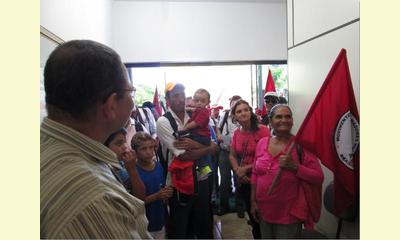|
|
Land Reform for a Culture of Peace (Brazil)
un article par Marcos Estrada
On Monday 15th of July 2013, members of the
Landless Movement (Movimento dos Sem Terra- MST)
in Brazil, from the landless camp Antonio Irmão,
visited the Town Hall in the town of Itaquirai,
state of Mato Grosso do Sul, where they are
camped. A group of more than 100 people came in
two buses, with their flags and their energy to
meet the mayor. They brought in their hands a
letter with three important and urgent demands,

click on photo to enlarge
Although they had not previously scheduled a
meeting with the Mayor Ricardo Favaro and the
Vice-Mayor Daniel Mamedio and their team, all were
received without any problem. Upon their arrival,
a small group for negotiation was invited to the
meeting room, where a chat took place smoothly
during over one hour.
During the meeting the three demands were
discussed: the question of the wells from where
the MST Members get their water from in the
landless camp; the question of the basic medical
services in the landless camp; and the position of
the local government in relation to the 134
families living in this landless camp in his town.
In relation to the wells, the mayor expressed he
was not aware of the lack of water in the landless
camp due to the malfunction of some of the wells
as a result of the heavy rain which led to the bad
quality of the water. It was assured that by
Thursday 18 July 2013, or even before, the well of
the school in the landless camp would be fixed.
It would be before the return of the classes in
the coming week, which was possible because the
tubes necessary to fix the well were already in
the Town Hall. It was also agreed that the Town
Hall would carry out an analysis of the water in
all wells of the landless camp. In fact, on 16
July, the Town Hall contacted the Landless camp
about the analysis of the water and confirmed to
put the required tubes in the well of the school,
as they had assured.
In relation to the basic medical services, it was
guaranteed that the negotiation with the
responsible person in the health sector in the
landless camp would continue, and she would
receive all possible medication, and in sufficient
quantities, so minor accidents or non-serious
illnesses could be treated in the camp. It was
also agreed that there would be a better
communication between the Town Hall and the
members of the MST, so the health of all could be
protected. In addition, the town hall would
provide a first aid kit to be used in the landless
camp.
In this meeting, the mayor said he was previously
unaware of the three areas for settlement, which
according to the MST members, INCRA ( Brazilian
Institute for Colonisation and Land Reform)
claimed to exist in this town. The mayor gave his
word to find out if these areas exist and where
they are located. As the Mayor Favaro said ‘the
town wins much more with a settlement than with a
landless camp’.
This is an example of how people working together
can make a better world towards a Culture of Peace.
(Click here for a Portuguese version of this article)
|








|
DISCUSSION
Question(s) liée(s) à cet article:
How important is community development for a culture of peace?,
* * * * *
Commentaire le plus récent:
Community plays a important role in developing culture peace. We should promote our cultural values by interacting with each other and making these values part of our daily lives. A good example of this would be raising our children according to beliefs and values which are important for us and our cultural peace. We can also promote cultural peace by making small commuinties within big community and share different ideas and bring new ones in.

|
|









